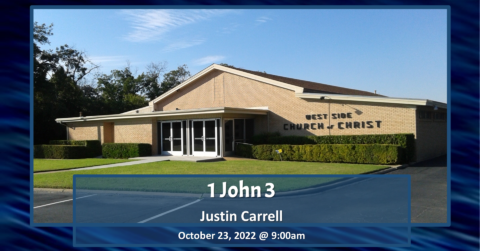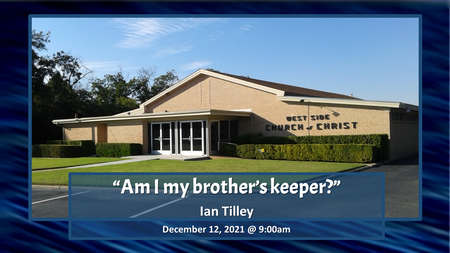Category: Love
Subject: Love
Sermon: Work to Do in the New Year

There are three important things to work on as 2023 begins. Work on your love for God and man, Your zeal in obeying God, and your Thankfulness for His great blessings.
A New Year Is Upon Us

Next Sunday we will be beginning a new year on the calendar. I know that resolutions can be made at any time, and do not need to wait until the calendar turns its page. But, this is as good a time as any to review your commitment to the Lord, and determine to better in the future. So, might I make a few suggestions…
Work on Your Love
The two great commandments, emphasized by Jesus for us as well, “The first of all the commandments is: ‘Hear, O Israel, the Lord our God, the Lord is one. 30 And you shall love the Lord your God with all your heart, with all your soul, with all your mind, and with all your strength.’ This is the first commandment. 31 And the second, like it, is this: ‘You shall love your neighbor as yourself.’ There is no other commandment greater than these” (Mark 12:29-31). Continue reading “A New Year Is Upon Us” →
Sermon: 1 John 3
Paul’s Appeal to Philemon
It is important to learn how to get along with brethren. This is an effective skill that helps to maintain unity among God’s people. It is especially important when there is any hint of trouble—whether disagreements or other potentially challenging circumstances.
“Pursue peace with all people, and holiness, without which no one will see the Lord” (Hebrews 12:14).
Paul had such a sticky wicket to deal with when he converted an escaped slave, and had to petition the slave’s owner for mercy. Fortunately, the slave owner was himself a Christian, and so there was common ground that could help in resolving the potential conflict.
Lessons from a Millstone
We speak of God’s word as sublime. In this we acknowledge both that the word of God is understandable, and that it is unfathomably deep and productive as we study it each day. The simplest of babes can derive from it the “words of eternal life” (John 6:68), and yet the ablest of students can spend a lifetime of learning from it each day.
Lessons can be learned from unexpected places. For example, we can learn much from the Bible’s reference to the millstone. The millstone was extremely important in ancient times. To turn grain into flour, the grain would be crushed into powder between two heavy stones. Smaller versions of such stones were found in the homes of the people. Larger stones were fashioned in ancient societies to increase production. Regardless, as the Bible refers to such millstones, there are three thoughts to keep in mind. First, they were necessities. Second, they were hard. Third, they were heavy. With this in mind, consider the following truths:
How Great is Your Concern?
Anyone who has read the letters of Paul know that he was a passionate man. He was open in expressing anger, sorrow, joy and concern. One example of this is an expression of concern for the Christians in Thessalonica. Note his words:
“Therefore, when we could no longer endure it, we thought it good to be left in Athens alone, and sent Timothy, our brother and minister of God, and our fellow laborer in the gospel of Christ, to establish you and encourage you concerning your faith, that no one should be shaken by these afflictions; for you yourselves know that we are appointed to this… (5) For this reason, when I could no longer endure it, I sent to know your faith, lest by some means the tempter had tempted you, and our labor might be in vain” (1 Thessalonians 3:1-3, 5).
So, twice in five verses, Paul expressed the degree of his concern for those in Thessalonica, “when I could no longer endure it…” They were suffering affliction and tribulation. While it would be understandable to worry about them physically, Paul (as seen in verse 5) was concerned about their spiritual welfare.
A simple question occurs. How intensely do you care for the spiritual welfare of your brethren? Has there been a time when you could endure silence or inaction no longer? A time when you were compelled to speak or act? This is the test of love. “Love the brotherhood”! (1 Peter 2:17).
Click below to…
Our Condescending God
The word condescend is an interesting one. We tend to bristle when someone speaks in a condescending tone toward us. It is a sign to us that they think they are better, stronger, smarter, wiser than us. It seems to indicate arrogance, and we find it unseemly.
The word condescend is defined by Webster: 1) to assume an air of superiority. 2a) to descend to a less formal or dignified level. 2b) to waive the privileges of rank.
While the word does hold negative connotations, such is not necessary. Consider the reality that God is truly superior. If He condescends to His creation, it is not a negative thing. It is an indication of His love and concern for us.
The Psalmist recognized this. “From the rising of the sun to its going down, the Lord’s name is to be praised. The Lord is high above all nations, His glory above the heavens. Who is like the Lord our God, Who dwells on high, Who humbles Himself to behold the things that are in the heavens and in the earth?” (Psalm 113:3-6).
God condescended to send His Son to earth to benefit mankind. His Son condescended to come, “taking the form of a bondservant, and coming in the likeness of men. And being found in appearance as a man, He humbled Himself and became obedient to the point of death, even the death of the cross” (Philippians 2:7-8).
God came down to our level, to lift us up to His. “Blessed be the name of the Lord from this time forth and forevermore!” (Psalm 113:2).
Click below to…
Reasons for Thanksgiving
In Paul’s second letter to the Thessalonians, he began by expressing thanksgiving for them. Why was he thankful?
-
Because it was fitting (3). In other words, there was a legitimate reason for his joy. Its origin was their conduct in Christ, which he lists in verses 3-4.
-
Because their faith was growing exceedingly (3). These Christians hadn’t stalled in their faith as others did and can do today (Hebrews 5:12—6:6). Through diligence and effort, they were making progress, and growing stronger spiritually.
-
Because their love for each other was abundant (3). John considered this the primary characteristic identifying the people of God (1 John 4:7-11). The Thessalonians were wonderful examples of the proper response to God’s love. “Beloved, if God so loved us, we also ought to love one another.”
-
Because they were strong in faith and patience in the midst of tribulation and persecution (10). It is one thing to be strong when the going is easy. It is a true reason to rejoice when faithfulness is seen despite the devil’s attempt to destroy it. The zeal of the Thessalonians was truly praiseworthy.
So, a natural question to ask… Is our congregation one that Paul would “thank God always for”? Are we growing in faith? Abounding in Love? Remaining steadfast despite trials? It is important to be counted “worthy of this calling” (11).
Click below to…
Sermon: Knowledge VS Love
Knowledge can bring arrogance, if it is not tempered by the love of a Christian. Though knowledge is good, love must be present too, in order to please God.
Sermon: It is Finished
Speaker: Josh Cox
An examination of Jesus’ last words on the cross as He died for the sins of mankind. Applications are made to our own lives.
The Patternists: Love One Another
When we advocate for authority for all our practices, invariably some will seek to contrast such a position with the counterpoint of loving one another. As if the two are contradictory. They are not.
Why would the two be perceived as counterintuitive to one another? There are a couple of possible reasons. First, some may not realize that convicting others of sin is an act of love. Since the condemnation of sin can be unpleasant, it is perceived as unloving. Consider Paul’s words, “Brethren, if a man is overtaken in any trespass, you who are spiritual restore such a one in a spirit of gentleness, considering yourself lest you also be tempted. Bear one another’s burdens, and so fulfill the law of Christ” (Galatians 6:1-2). It is an act of love to bring someone back from sin to reconciliation.
Three Rules
Social media is often criticized as a waste of time, and a potential stumbling block to Christians. This certainly can be so, but there are also good messages and thoughts that you come across from time to time.
A couple of weeks ago, I came across this jewel, and wanted to share it with you. Read it, and consider your own practice when you come to worship on the Lord’s day. Are you doing a good job of interacting with visitors and other members, to make them feel welcome and cared for? Consider these words:
My husband has three rules of engagement when we go to church.
- An alone person in our gathering is an emergency.
- Friends can wait.
- Introduce a newcomer to someone else.
Her husband sounds like a man who understands the importance of the church as a family. Each member of our congregation is equally important and significant. Each member is deserving of our attention and expressions of love. Is every member getting what they need and deserve from you? Think about it!
Click below to…
The Fragrance of Christ
In 2 Corinthians 2:14-16, Paul poetically refers to the knowledge of Christ (which he preached) as a fragrance. He wrote, “For we are to God the fragrance of Christ among those who are being saved and among those who are perishing” (15).
It is interesting to note that in the NKJV the word “fragrance” is used in verses 14 and 15. But, the word “aroma” is used in verse 16. These are two similar, but different Greek words.
“Fragrance” comes from the Greek (euodia) and refers to a sweet or good scent. The KJV translates it “sweet savour.”
However, “aroma” is from the Greek (osme), and simply means a smell or odor. The KJV translates it “savour.” Why the difference?
Verses 14 and 15 refer to the objective reality. The gospel of Jesus Christ is sweet. It is good. There is no disputing this truth. Jesus died on the cross for mankind. His death was an expression of God’s grace, and love toward man.
Verse 16 refers to the subjective perception individuals have about the gospel of Christ. “To the one [those who are perishing] we are the aroma of death [a stench] leading to death, and to the other [those who are being saved] the aroma of life [a sweet scent] leading to life.”
The good news of the gospel is a sweet smell. But, the most important question is, “How does it smell to you?”
Click below to…
A Lover of Good
The NKJV phrase, “a lover of good” appears only in Titus 1:8, as one of the qualifications of an elder. It is translated from the Greek word philágatho ).
This Greek term is from the root philos (fond of) and agathos (that which is good). Though the KJV translates the term, “a lover of good men”, it is important to note that there is nothing in the definition of the word or the context that limits it only to men. An elder is to be fond of all that is good. Here, the RSV, NKJV, ESV, and numerous other translations rightly leave off “man.”
The lexicographers all offer simple definitions of the term. Strong — fond of good; Thayer — loving goodness; Vine — loving that which is good. The term is plain, and easily understood.
Interestingly, the negative aphilágathos is found in 2 Timothy 3:3, when referring to ungodly people of the last days. Here the translation reads, “not loving good.”
The elder should have this as a part of his character because every Christian should have it as a part of his character! One of the identifying characteristics of the child of God is that he hates darkness, and loves the light. As Paul wrote in his treatise on love, that “it does not rejoice at wrongdoing, but rejoices with the truth” (1 Corinthians 13:6).
We are children of the light. Each of us are to love righteousness, and reject sin.
Click below to…
Sermon: “Am I my brother’s Keeper?”
Speaker: Ian Tilley
Ian discusses the obligations we have to edify and encourage one another, with many applications.

















